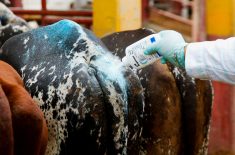The Manitoba government has application forms ready for farmers seeking funding from the federal/provincial Growing Forward programs, apart from business risk management (BRM) plans such as AgriStability or AgriRecovery.
The province, in three separate statements Wednesday, announced applications are now available for the Environmental Farm Action Program (EFAP), Manitoba Sustainable Agriculture Practices Program (MSAPP) and the Business Skills Suite of programs.
EFAP, which requires participating producers to develop Environmental Farm Plans (EFPs) and provide a valid statement of completion, will be administered by the provincial ag department.
Read Also

B.C. ostriches now to be culled after ruling: CFIA
Birds are now to be culled from a British Columbia ostrich operation that sought to bypass standard federal practice in on-farm outbreaks of highly pathogenic avian influenza and has been denied an appeal at Canada’s highest court.
EFAP follows the previous federal/provincial Environmental Farm Plan (EFP) program, in which about 6,500 Manitoba producers took part and 5,611 statements of completion were issued. That translates to over 8.8 million acres of land farmers have assessed so far through the EFP process, the province said.
EFAP is meant to support farmers in taking on projects to reduce identified environmental risks and improve the management of Manitoba’s farmland, water resources, air quality, soil productivity and wildlife habitats.
BMPs against GHGs
MSAPP, meanwhile, is to include a beneficial management practices (BMPs) incentive to encourage farmers to put sustainable agriculture practices in place to help reduce greenhouse-gas (GHG) emissions that contribute to climate change.
Such projects, Agriculture Minister Rosann Wowchuk said, could include planting perennial cover crops to secure sensitive land, using manure storage covers to reduce GHGs and odours, using reduced tillage and increasing the use of perennial legumes in rotations.
MSAPP, also offered through the provincial ag department, will be administered in conjunction with EFAP, the province said Wednesday.
The Business Skills Suite includes five areas of support: agri-extension business, agri-skills, agri-advisors, succeeding generations and 4-H programs.
Its target clients include farm and post-farm business managers, “ensuring the inclusion of women, young farmers, Aboriginal people, youth and new Canadians,” the province said.
The Agri-Extension Business program is meant to help farm and agri-food businesses to expand their business/operations knowledge and increase the use of beneficial business management practices.
The Agri-Skills program is to help fund farmers and agri-product processors to obtain training in both business skills and development. The Succeeding Generations program, meanwhile, is directed at young farmers, to help them develop and manage viable farming practices through financial management information, training and mentorship.
The Agri-Advisor program is to help Manitoba farmers and agrifood processors to “develop sound and competitive business plans, evaluate business concepts and provide an analysis of existing business plans.”
The 4-H program is expected to increase exposure to business development practices among Manitoba 4-H Council, youth and youth leaders.










